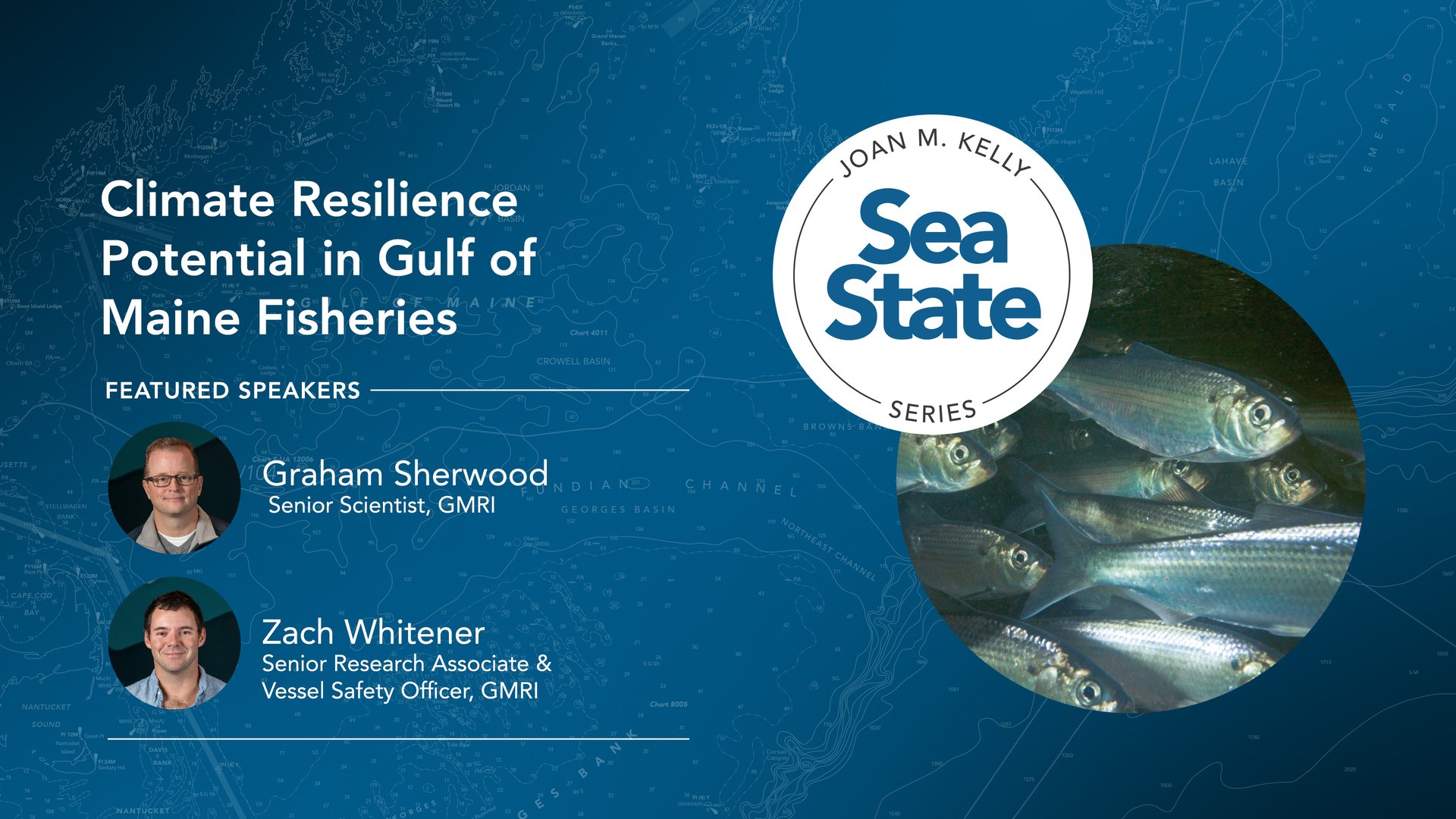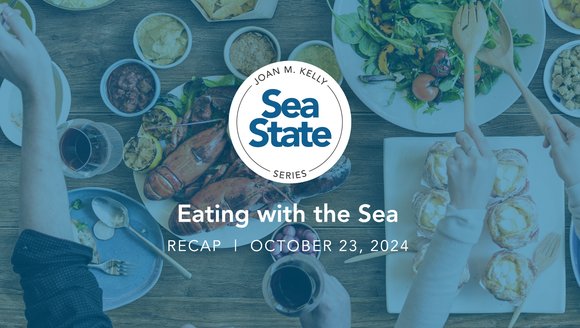Sea State Recap: Climate Resilience Potential in Gulf of Maine Fisheries
Perspectives | Dec 9, 2024
The Gulf of Maine Research Institute’s Joan M. Kelly Sea State Series provides the public with opportunities to talk with and learn from experts across a variety fields. This year's series explores our efforts to foster resilience in a rapidly changing environment and shares reasons for optimism about the Gulf of Maine's future and the communities that rely on it. Here's a recap of the Sea State seminar, Climate Resilience Potential in the Gulf of Maine, in case you missed it. This seminar took place on November 20, 2024.

The rapid warming of the Gulf of Maine has significant implications for the marine species and fisheries that have historically defined this region. Understanding how different species are responding and adapting (or not) to the changing environmental conditions is crucial for managing these resources sustainably.
On November 20, 2024, we hosted the latest session of its Sea State seminar series, titled “Climate Resilience Potential in Gulf of Maine Fisheries.” The seminar featured Dr. Graham Sherwood, Senior Scientist at GMRI, and Zach Whitener, Senior Research Associate, who discussed the challenges and opportunities that climate change presents for the region’s fisheries. Through specific examples and case studies, both speakers highlighted the resilience potential in the face of climate-driven disruptions.

Dr. Graham Sherwood, the leader of our Fisheries Ecology Lab, began by addressing the Gulf of Maine’s warming waters, which are among the fastest warming in the world. This rapid change in temperature is already influencing fish distribution and abundance. “The Gulf of Maine is warming faster than nearly any other body of water on the planet,” Dr. Sherwood explained.
“Oftentimes, people think that if it gets too warm in the Gulf of Maine, fish are just going to pack their bags and go to Canada. But in reality, species like cod, pollock, and herring are very localized in terms of where they can actually live and in what defines their population and stock boundaries. They don't generally move out of that defined area, but they do have the capacity to move within those areas.”
However, the Gulf of Maine is not uniformly warm, or it's not uniformly one temperature. It is not unusual for temperatures to differ by as much as 10 degrees Celsius between coastal areas like Bar Harbor and more central Gulf of Maine regions like Georges Bank. This lack of temperature uniformity across the region means that species are responding in complex ways, with some finding thermal refuges, some undertaking seasonal migrations, and others struggling to adapt to the warming conditions.
Species-Specific Responses to Warming Waters
For some species, these diverse temperatures throughout the Gulf of Maine can function as a thermal refuge, or as pockets of resilience. This appears to be the case for herring, which are a keystone species and an important forage food for many other animals in the region. Herring here are at the southern end of their natural range, making them vulnerable to warming temperatures. We have evidence that during very warm years in the Gulf of Maine, herring are turning from their typical spawning grounds on Georges Bank and the western Gulf of Maine and heading to areas along the coast of Maine that are several degrees cooler.
Similarly, cod – at one time a staple catch in the region – has been demonstrating movements to colder water in the Gulf of Maine, evidenced by a slight northward shift in their distribution. It remains to be seen how long cod can continue to exist in the warming Gulf of Maine with this strategy.
On the other hand, cod may have one other strategy in their bag of tricks. “We’ve known for some time that cod exist as two distinct color variants in the Gulf of Maine – the more commonly caught olive cod, and a lesser known red type. It turns out that the red type appears to be pre-adapted to warmer water, likely a result of a more shallow-living strategy. These cod may offer the best chance for the species to persist in the area” explained Dr. Sherwood.

Climate Resilience in Fisheries
Understanding these nuanced ecological shifts is crucial for managing the Gulf of Maine's resources sustainably in the face of climate change.
While this shift presents a challenge in terms of how to manage changing fisheries, it also highlights how marine ecosystems are evolving in response to a changing climate.
These kinds of changes are a reminder that the ocean is not a static environment — it's constantly shifting, and we need to adapt our management strategies accordingly.
Graham Sherwood, Ph.D. Senior Scientist![]() Graham Sherwood, Ph.D. Senior Scientist
Graham Sherwood, Ph.D. Senior Scientist
Zach Whitener’s presentation offered a unique blend of personal anecdotes and fisheries science. As someone who grew up on Long Island, Casco Bay, Whitener drew from his early years in a lobster-dependent community and his career spanning fishing, research, and education.
“I’m a man of many hats,” he began. “I’m a fisherman, a scientist, a guide, an all-around boat guy at GMRI.” His talk delved into the changes he has witnessed in the Gulf of Maine, both from a community and ecological standpoint.
Lessons from the Past
Whitener shared a poignant story about the collapse of the groundfish industry in the 1990s and the federal buyout program that followed.
“One of my first memories on the island was a boat-burning party. The federal government was buying back permits to reduce overcapacity in the fishery. To prove the boat wouldn’t fish again, you had to destroy it. So, there we were, watching this man burn his boat, tears in his eyes, and yet it was a party because it was the only way to deal with it emotionally.”
This transition is one of many that Gulf of Maine fishermen have experienced over the last few decades and highlights how diversification is key to resilience. Whitener noted that most recently, the rise of aquaculture and the resurgence of pogies have been lifelines for this region, providing critical economic opportunity — especially for fishermen looking to diversify beyond lobster.
Adapting to Change
Whitener highlighted how scientific research is helping to guide fisheries management in a changing climate. He discussed our work on Atlantic pollock, a species that has grown in importance as cod stocks decline.
“Our jigging surveys show pollock have proliferated in recent years. They’re ecologically similar to cod, but they also bring unique challenges and opportunities. For example, we’ve observed red morphs in pollock, similar to what Graham mentioned with red cod. These might have different growth trajectories or temperature tolerances, and we’re eager to learn more.”


The Role of Community Science
He also highlighted how community-driven science plays a vital role in adapting to change and sustaining fisheries, drawing on his early experiences with data collection. As part of the ventless trap surveys and the eMOLT program, he attached temperature sensors to his traps and shared the data with Woods Hole researchers. When his numbers initially appeared to be an outlier, it turned out his small boat's shallow-water observations had captured higher temperatures compared to those recorded by others and a five-degree swing perfectly aligned with the tidal cycle. This unexpected finding underscored the value of localized, hands-on contributions to fisheries science.
“I’ve always believed that the people who are out on the water every day have a unique perspective to contribute to science,” Whitener said. “Whether it’s noticing new species, understanding temperature changes, or sharing generational knowledge, community science is essential for managing our resources effectively.”
Whitener’s work at GMRI exemplifies this approach, blending traditional scientific methods with local knowledge. For example, the Casco Bay Aquatic System Survey (CBASS) combines seine surveys, acoustic monitoring, and jigging surveys to track species like cod and pollock.
“The focus of our jigging surveys, which started with cod, now include pollock because that’s what we’re seeing more of. Our research has to adapt to what’s actually here, and that means also incorporating insights from fishermen who know these waters better than anyone.”
Looking Ahead
Whitener closed his presentation by emphasizing the need for both communities and science to adapt to the Gulf of Maine’s dynamic environment:
Even in my short lifetime, things have changed a lot. Our fisheries, our communities — they’ve always had to adapt. And that’s what we need to keep doing, both on the water and in the lab.
Zachary Whitener Senior Research Associate, Vessel Safety Officer![]() Zachary Whitener Senior Research Associate, Vessel Safety Officer
Zachary Whitener Senior Research Associate, Vessel Safety Officer
Stay tuned for future Sea State seminar events in the future, as well as our recap blogs in case you miss them!



